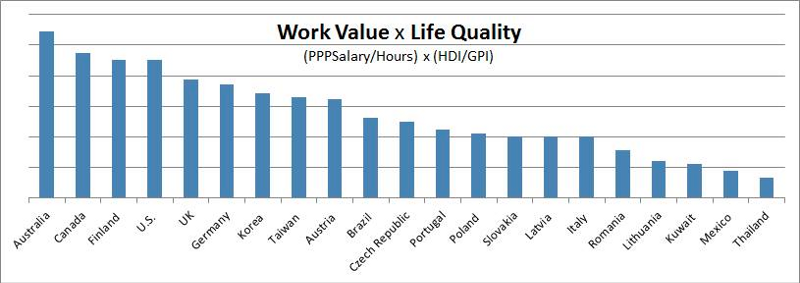Engineering — en·gi·neer·ing
Skillful or artful contrivance; maneuvering.
The art or science of making practical application of the knowledge of pure sciences.
Computer science engineers ought to question every aspect of their work in order to achieve perfection. This is the result of an inquiring mind shape that is quite common in the technology field. Thus the following question arises: why not engineer other domains of life besides the technical ones, such as our jobs, life quality and future?
I recently came across a blog post on Splinter.me in which several countries are ranked according to the average software developer salary adjusted to the cost of living of each country. The central idea is to avoid unfair comparisons of salaries that disregard the difference in living expenses.
To attain a more useful metric (and also introducing an extremely geek factor), I’ve extended the premises to consider other variables. Given the wide-spread idea of a work vs life dichotomy, I propose a formulation based on Work Value x Life Quality, where work value indicates how much the monetary compensation is valued in that country, given its average developer salary, number of working hours, taxes, and purchasing power parity, whereas life quality is a reflection of the country development in terms of access to education, life expectancy (which is a consequence of several factors such as access to health facilities), and levels of crime and social stability.

Using Purchasing Power Parity (PPP) allows one to compare different average developer salaries (kindly provided by http://worldsalaries.org) by taking into consideration the expenses level of the country. By dividing the PPP normalized salary (after taxes) by the number of working hours, we obtain a comparable unit of compensation-for-effort for a specific country.
Life quality can be largely represented by the Human Development Index (HDI), which is a “composite statistic of life expectancy, education, and income indices”, and by the Global Peace Index (GPI), which translates into the country’s level of political instability, international relations, crime, terrorism, war, etc. Dividing the HDI by the GPI returns a ratio which roughly reflects the well-being and peacefulness of citizens.
Bringing back the initial formula of Work Value x Life Quality, we obtain PPPNetSalary/WorkingHours x HDI/GPI. Using this formulation puts Australia, Canada and Finland at the podium of best countries for developers to both work and live.
Relocating to a new country to work at a new awesome tech job might be as challenging as life changing, and therefore it bears some careful thought! I hope this post helps someone engineer their future.
Cheers,
Paulo Gaspar
http://www.paulogaspar.net






0 Comments